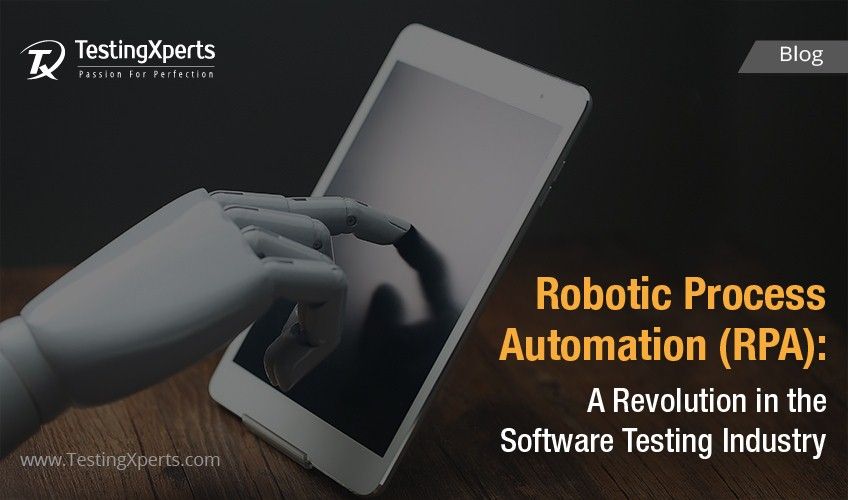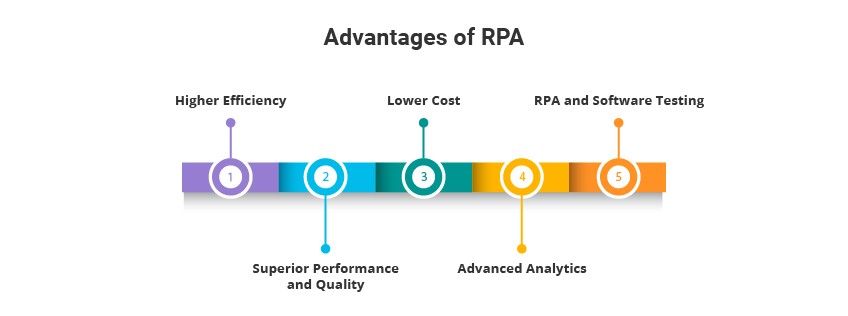Recommended Blogs
Robotic Process Automation (RPA): A Revolution in the Software Testing Industry

Automation has tremendously changed the face of the IT industry and is playing an imperative role in every industry these days. Automation has reduced the mundane human work, the labor cost and has increased reliability and throughput by enhancing the process quality. New and emerging technologies, such as Artificial intelligence (AI), cognitive computing, the Internet of Things (IoT), and machine learning are revolutionizing all industries. Some implementations like self-driving cars are set to change the digital world.
Contents
Advances in software and AI world are paving the way for Robotic Process Automation. It is the most recent technology which has the capability to re-invent the business process management landscape. This innovative technology uses robots or the software program to perform certain arduous jobs and several business workflows with great accuracy. RPA is now replacing various repetitive jobs and connected jobs across the business organizations.
Why Robotic Process Automation (RPA)?
The RPA has several advantages due to which it is used in most of the industries. One of the major advantages is its power of working 24/7 without any breaks. This efficient and effective technology helps in saving a lot of time and money. It is relatively different from the previous automation improvements. It is highly accessible and discernible, allows users to monitor and review logged processes completed by RPA tools. RPA is not just limited to the finance and accounting industry but is also proving its worth in the industries like telecommunications, utilities, mining, travel, retail and highly structured industries like healthcare.
Built with an operating procedure, RPA defines the series of steps which are performed by robots for a specific process. The process is transformed into the software program via code which is executed by the robots and carries out different tasks. It has the capability of controlling the system in the similar manner as humans do in concluding the process. The bots in the RPA emulate the human activities and perform the rule-based tasks, which is the reason it is accepted in most of the industries. In brief, RPA is intended to reduce and eradicate the need for resources to perform high-value tasks. It is bringing agility across functions and industries.
Advantages of Robotic Process Automation(RPA)
Higher Efficiency:
RPA helps in reducing the cycle time and brings enhanced productivity to the table.
Superior Performance and Quality:
Robots working continuously and vigorously ensure greater precision resulting in high quality.
Lower Cost:
Replacing a full-time resource with Robotic Process Automation can bring around 20%-25% cost savings.
Advanced Analytics:
RPA organizes and gathers data easily, helping in predicting the future results easily.
Robotic Process Automation and Software Testing: What’s the Connection?
The advent of new processes and technology over the years has spurred a revolution in QA and software testing industry. In order to meet the demand for shortening time-to-market and ensure good quality output, enterprises need more than just the agile methodology and delivery. They need pervasive process automation to help minimize errors and optimize processes. This brings the need for Robotic Process Automation (RPA) as it helps to facilitate the high-end performance with very less effort. It efficiently reduces the efforts required in performing end-to-end testing while structuring the conventional APIs, collaborations, and business validations to dissolve and resolve data silos.
Robotic Process Automation is having a significant role played in QA development. It helps the business to gain more value by assuring stability and scalability. Also, it can be used to reduce end-to-end testing by structuring and collaborating the APIs. The use of Robotic Process Automation exclusively helps in meeting the present customer demand for producing faster and better outputs. This is the reason; Robotic Process Automation is becoming a top choice for many business sectors.
The implementation of RPA to test automation helps in minimizing errors and results in producing a high-quality product with less efforts. The reasons why the need for RPA in test automation is abundantly increasing for the present market are:
– There is no need for the teams to have skills related to programming to perform RPA test automation
– The technology is user-friendly and thus it is effectively receiving the call from different types of industries
– The workforce requirement is less and thus results in cost savings
– Robotic Process Automation is platform-independent and it can support web applications, desktop applications, and mobile applications
– Work can be scheduled and monitored 24*7
– Repetitive tasks can be easily automated and this helps to reduce manual efforts and eliminates human-made errors
Which industry sectors are leveraging RPA?
Insurance: In this industry, Robotic Process Automation is used for arranging appointments, to maintain billings, patient’s data, etc.
Banking: In this industry, Robotic Process Automation is used for increasing data accuracy, work efficiency, and security.
Retail: In this industry type, RPA helps to send notifications, to ship and track the products, for sending updates related to orders, offers, etc.
Manufacturing: In this industry, RPA helps in many ways such as to maintain the procedures of supply chains, for billing the materials, to provide support and services for customers, etc.
Telecommunications: In this industry, Robotic Process Automation helps to track fraud data management, monitors the data, etc.
Travel and Tourism: In this industry, Robotic Process Automation helps in managing passenger’s details, to book tickets, for processing bills, etc.
What are the RPA tools?
1. UiPath:
This is one of the top RPA platform tools for end-to-end test automation. It is widely chosen across the world by many big industries for achieving quality results, improved productivity, enhanced customer satisfaction, etc.
2. A utomation Anywhere:
This tool is known as the only cloud-native, web-based, AI-powered Robotic Process Automation platform tool. This tool is efficient in providing cloud and on-premises services for small and large industries.
3. Blue Prism:
This is an efficient tool providing services with all core capabilities. It is capable to work with any application on any platform. Though the tool is user-friendly, it is required for the teams to have knowledge of programming.
4. Pega:
This tool is known as a Business Process Management tool and it is used on the desktop servers of Linux, Windows, and Mac. The cloud-based services of this tool are the best choice for medium and large industries.
5. Inflectra Rapise:
This tool is efficient in providing services for hybrid businesses. It is efficient in automating web, mobile, and desktop applications. This tool is easy for both non-developers and programmers.
6. Another Monday:
This tool offers complete end-to-end automation services. With its new AM Muse tool, it is efficient in providing automatic documentation of the process. Also, the tool is user-friendly and doesn’t demand the user for having knowledge of development.
TestingXperts’ Capabilities in Robotic Process Automation
The demand for better data quality, driven by the rapid adoption of disruptive technologies is forcing enterprises to re-evaluate their QA and software testing strategies. Moving with the technological transformations and transforming the conventional forms of testing, TestingXperts (Tx) has been providing comprehensive RPA testing to various clients. Tx with its qa automation testing services is widely contributing to the organizations in the form of automated data manipulation, data entry, formatting, etc. Connect with us to know more about our specialization in RPA based testing
Discover more


